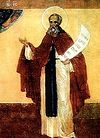

| Previous day | Next day |
| Old Style
October 18
|
Tuesday |
New Style
October 31
|
| 22nd Week after Pentecost. Tone 4. | No fast.
|
![]() Holy Apostle and Evangelist Luke (1st c.).
Holy Apostle and Evangelist Luke (1st c.). ![]() St. Joseph, founder of Volokolamsk (Volotsk) Monastery (1515).
St. Joseph, founder of Volokolamsk (Volotsk) Monastery (1515).
Martyr Marinus the Elder, at Anazarbus (4th c.). St. Julian the Hermit, of Mesopotamia (4th c.). St. Dionysius the Greek, archbishop of Rostov and Yaroslavl (1425). St. David, abbot, of Serpukhov (1520).
New Hieromartyrs Andrew Voskresensky, archpriest, of Karpovo (Moscow) and Nicholas Sokolov, archpriest, of Krymskoye (Moscow) (1937).
Hieromartyr Mnason, bishop of Cyprus (1st c.). Sts. Symeon, Theodore (monks), and Euphrosyne, who found the Icon of the Mother of God in the Great Cave of the Peloponnese (9th c.). New Martyrs Gabriel and Cirmidol, of Egypt (1522). St. Peter of Cetinje, metropolitan of Montenegro (1830).
Slaying of Jose Muñoz-Cortes (in monasticism Monk Ambrose), guardian of the myrrh-streaming “Montreal” Iveron Icon of the Theotokos (1997).
Thoughts for Each Day of the Year
According to the Daily Church Readings from the Word of God
By St. Theophan the Recluse

Tuesday. [Col. 2:20-3:3; Luke 9:23-27]
Do not be ashamed to confess the Lord Jesus Christ as the incarnate Son of God who redeemed us through His death on the cross, who through His resurrection and ascension opened for us the entrance into the Kingdom of heaven. If you shall be ashamed, then He shall be ashamed of you, When he shall come in His own glory, and in His Father’s, and of the holy Angels. Now in society there is a trend to not talk at all about the Lord and about salvation, whereas in the beginning these dear subjects were all that people talked about. One’s talk more readily flows from the place where the heart abides. Can it really be that people’s hearts abide less with the Lord? Judging from the talk, this must be the case. Some do not know Him at all, others are cold towards Him. Fearing encounters with such people, even those who are warm towards the Lord do not direct the conversation towards Him, and the priesthood is silent. Now, talk about the Lord and Saviour and about our main concern—salvation—is excluded from the circle of talk acceptable in society. What, you say, are we really supposed to talk only about that? Why only about that? One can talk about anything, but in a way that is shaded by the spirit of Christ. Then it would be possible to guess whether the speaker is Christian or pagan. Now, however, it is impossible to guess what they are, neither by their talk, nor by their writings. Look through all the periodicals—what don’t they write there? But nobody wants to make Christian conversation. What a complicated time!



